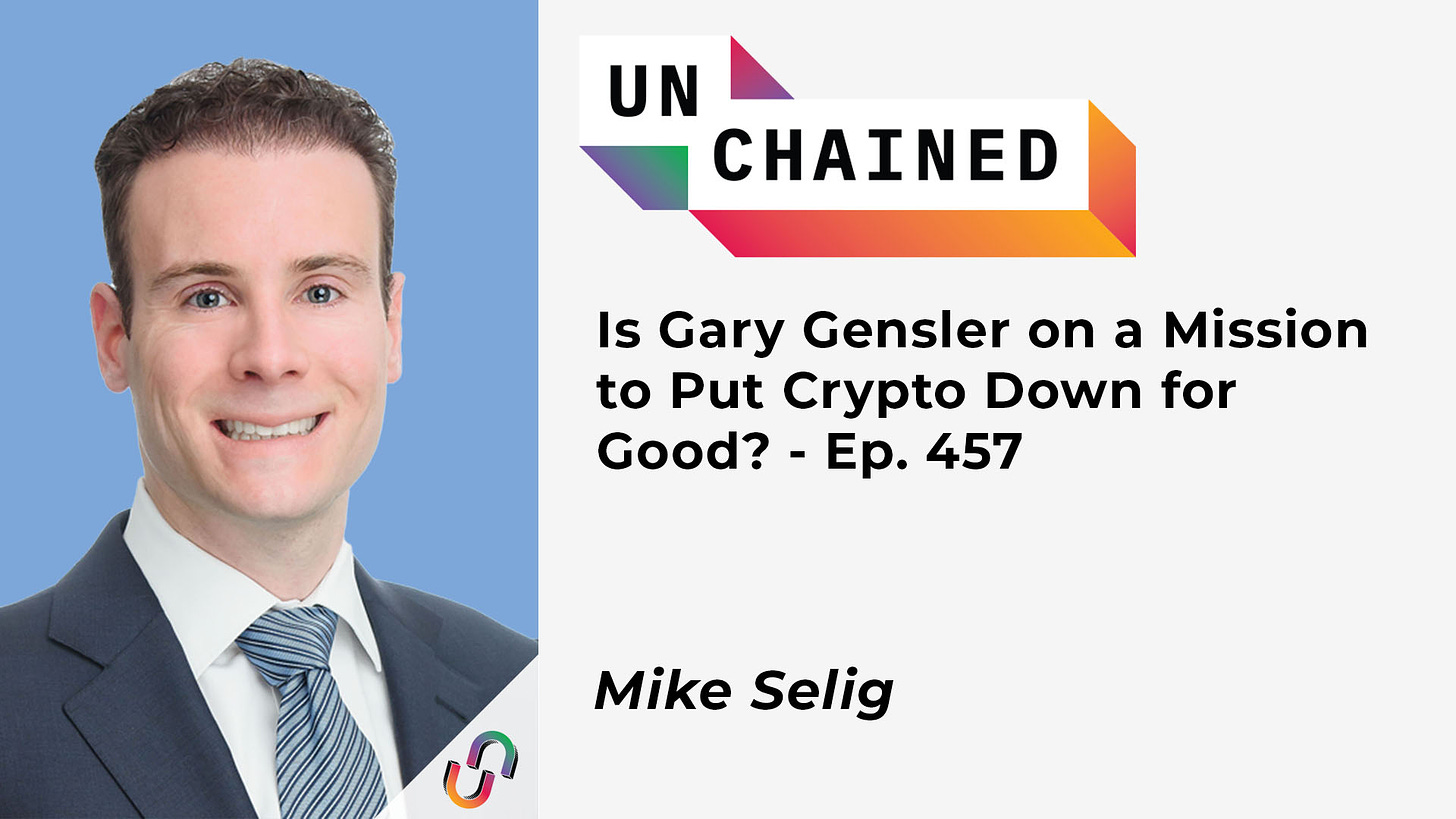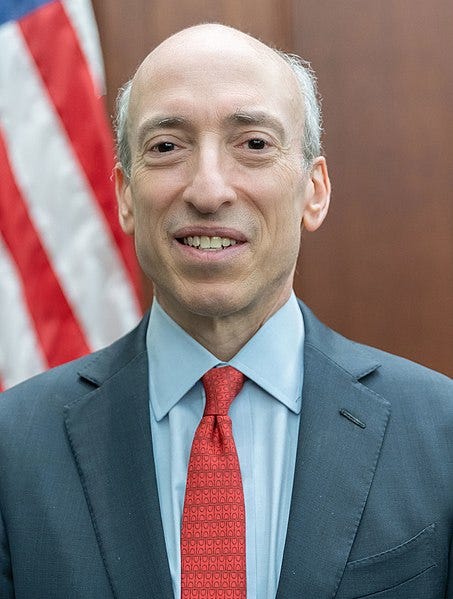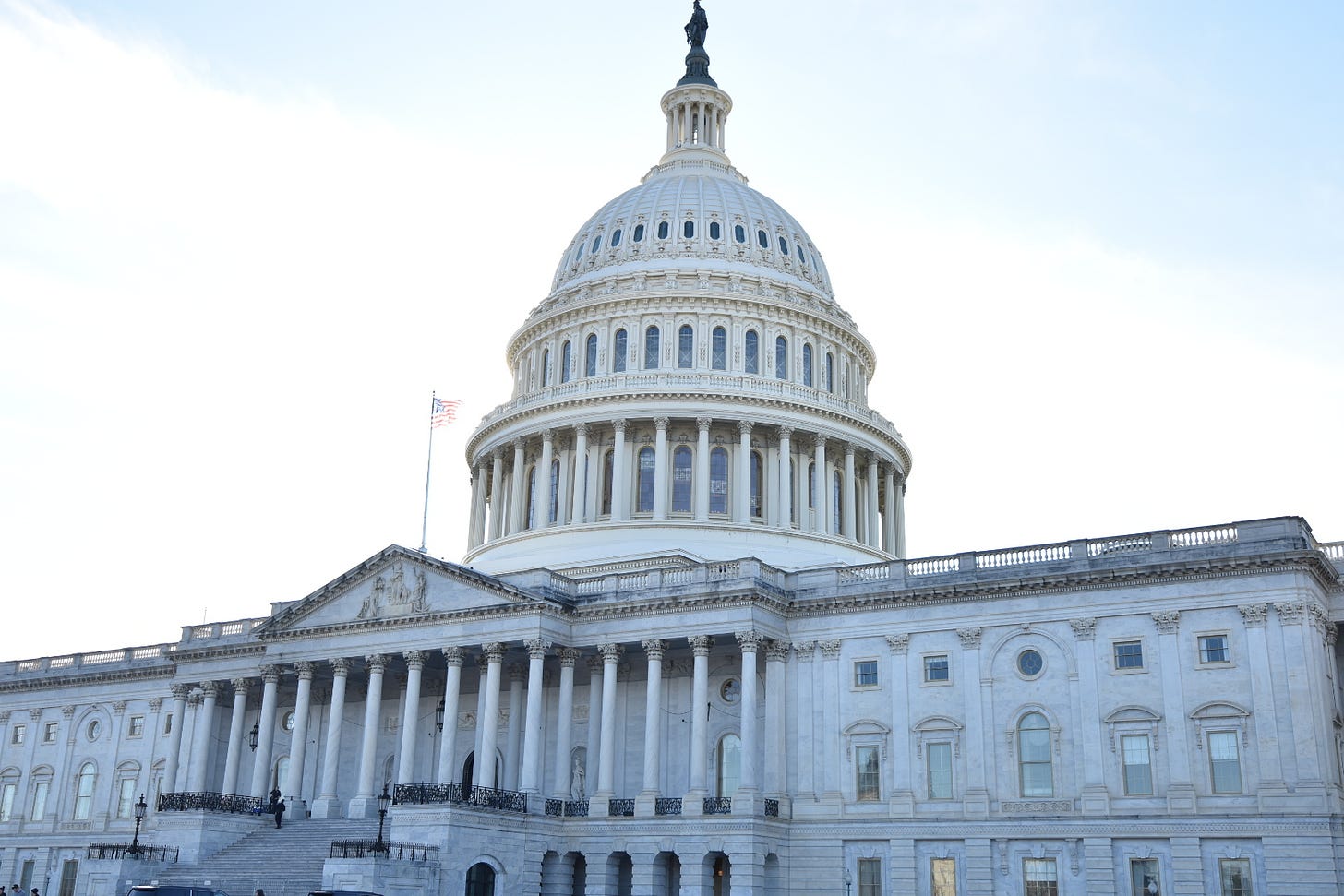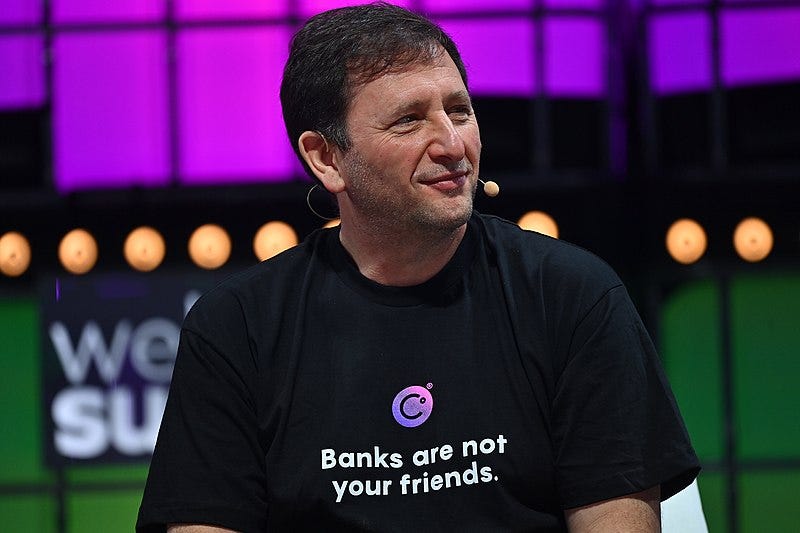SBF Could Have His Internet Access Cut Off ❌
Weekly News Recap: 🎙️ New pod on the regulators' crackdown, 🕵️ SBF co-signers reavaled, 👊 SEC vs. Do Kwon, 💰 Celsius' restructuring plans, and more!
Wait, why am I receiving two emails in one day?
On Unchained, we run two newsletters: Unchained Daily, which goes from Monday through Saturday, and Unchained Weekly (this one!), which recaps all the major crypto news of the past week. (It’s narrated on the podcast, so if you’re looking for the links to the stories heard on the show, they’re all in here!)
If you want to receive only one of the newsletters (for example, receive the daily and not the weekly, or vice versa), just go here and select whichever you want!
Is Gary Gensler on a Mission to Put Crypto Down for Good?
The FTX collapse happened three months ago, but the regulatory response appears to just be warming up. At least that’s how Mike Selig, counsel at Wilkie Farr, sees it.
On the Friday episode of Unchained, Selig said of the recent spate of regulatory events targeting crypto firms, “There's some coordination amongst regulators, both in the treasury department the prudential banking regulators, and at the market regulator level with the SEC and CFTC.” Noting that some of this appears to be a response to the alleged fraud at FTX, he continued, “But there's also been this concern that the opportunity being used by regulators to really cut off access to the crypto markets.”
In the episode, we cover how regulatory action could affect stablecoins, which is one of the most vital sectors within the industry, how regulators are looking at staking, and how Jay Clayton’s SEC differed from the current SEC under Gary Gensler.
Weekly News Recap
Sam Bankman-Fried’s Bail May Be Revoked; Co-Signers Are Revealed
At a hearing for the criminal case against Sam Bankman-Fried on Thursday, Judge Lewis Kaplan threatened to revoke the FTX cofounder’s bail if his access to electronic devices was not severely curtailed.
The hearing was scheduled after SBF was caught using a virtual private network (VPN) though he claimed to have used it while under house arrest to view the Super Bowl using an international sports subscription he purchased while living in the Bahamas. During the hearing Thursday, his lawyer, Mark Cohen, said, referring to SBF’s parents’ home, “there isn’t a television in the house.”
Earlier in the week, Judge Kaplan ordered the disclosure of the names of two mystery co-signers of SBF’s $250 million bail bond after Bankman-Fried's legal team failed to apply to the appeals court.
Stanford University-affiliated Larry Kramer and Andreas Paepcke were revealed as the bond signers. Kramer, a former dean of Stanford Law School, told CoinDesk that he signed the bond in a personal capacity after Bankman-Fried's parents, both Stanford professors, supported his family through a cancer battle. Paepcke is a senior research scientist in the computer science department.
Still, Sam got at least one piece of good news this week, as the civil lawsuits by the Securities and Exchange Commission and the Commodity Futures Trading Commission were placed on hold by US District Judge Kevin Castel.
Judge Castel approved the motion to stay the lawsuits, at the request of the Department of Justice, which is handling the criminal case against him. The DOJ argued that delaying these lawsuits was appropriate due to the substantial overlap between them and the criminal case.
FTX Bankruptcy Judge Rejects Request for an Independent Examiner
The FTX bankruptcy case also saw lots of movement this week. Judge John Dorsey rejected a motion to appoint an independent examiner, claiming that it would be too costly with multiple investigations already underway.

According to a court hearing on Wednesday, FTX transferred $7.7 billion worth of assets from its Bahamian estate to its US entities before filing for bankruptcy in Delaware. It’s unclear to which entity the assets belong.
In addition, the bankruptcy court served subpoenas to FTX insiders SBF, his father Joseph Bankman, mother Barbara Fried, former Alameda CEO Caroline Ellison, former FTX CTO Gary Wang, and former co-CEO of FTX Digital Markets Nishad Singh.
They are all required to produce various documents related to the now-defunct crypto exchange's activities. The subpoenas demand information on any payments, digital assets, real estate, fiat currency, or other assets received from any of the entities in the FTX Group, or from any executive or employee of any entity in the FTX Group.
On Wednesday, the New York Times reported that the new management of the exchange is in talks with the founders of hedge fund Modulo Capital to recover the $400 million invested by SBF. The founders are negotiating to return the funds with bankruptcy lawyers representing the exchange, aiming to be released from certain legal liabilities in return for the money.
Moreover, according to a report from the Wall Street Journal, a former FTX executive's foundation made almost $150 million in profit from the company's digital tokens and is now trying to access a frozen account on the exchange.
The SEC Sues TerraForm Labs and Do Kwon
Late Thursday, the SEC sued TerraForm Labs and its cofounder Do Kwon for fraud, selling unregistered securities and other charges. The SEC claimed that TerraForm and Kwon misled investors and that Luna and Anchor protocol were “crypto asset securities.” The suit alleges, "Terraform and Kwon also misled investors about one of the most important aspects of Terraform's offering – the stability of UST, the algorithmic 'stablecoin' purportedly pegged to the U.S. dollar.”
Earlier Thursday, when Bloomberg reported the SEC’s intention to sue, TerraForm issued a statement saying, “Terraform Labs has not been contacted about such a proceeding by the SEC and thus cannot comment.”
Congress Is Divided on Crypto
The Senate Banking Committee held a hearing titled “Crypto Crash,” which indicated that, post-FTX collapse, crypto may be emerging as a partisan issue.
Duke Law professor Lee Reiners, a crypto skeptic, stated that “crypto is doing more harm than good to our society,” while Linda Jeng from the Crypto Council for Innovation and Yasha Yedav from Vanderbilt Law defended crypto's potential for consumer empowerment and financial inclusivity.
Republican Senators blamed the SEC and its chair, Gary Gensler, for the cryptocurrency crash. Meanwhile, the Democrats seemed to think Gensler should be in charge of regulating the crypto industry. Although there is growing interest in crypto law, proposals will likely face hurdles, as the new Congress is split between parties.
Also this week, U.S. lawmakers asked the SEC to release its communications with FTX and its founder related to his arrest, raising questions about the timing of the arrest and the SEC's process.
Celsius May Get Acquired by Digital Asset Manager NovaWulf
Celsius Network, the bankrupt crypto lender, has proposed plans for a sale to NovaWulf Digital Management.
The new owners would invest between $45 million to $55 million in the firm and introduce additional divisions, including debit cards, factoring, trade finance and private wealth services.
The restructuring plan would see NovaWulf managing the new entity, with smaller Celsius creditors receiving the majority of their funds back and larger creditors getting tokenized shares in the new firm.
Meanwhile, CEL token holders could face a dilemma over their compensation, as the token may be valued at 20 cents, the ICO price, for the purposes of the recovery; its current value, however, is 54 cents.
Celsius’ lead attorney, Kirkland & Ellis's Ross Kwasteniet, said they were struggling to determine the fair value of the CEL token and how to compensate its holders without rewarding insiders. Additionally, the official committee of Celsius’s unsecured creditors filed court documents in an attempt to recover millions of dollars which they claim were transferred fraudulently by former CEO Alex Mashinsky, his wife and other former senior executives.
On a related note, KeyFi's Jason Stone, who has an ongoing legal dispute with Celsius, and other involved parties have been temporarily prohibited from transferring or disposing of property linked to the lender's bankruptcy case.
Genesis Files a Restructuring Plan
Crypto lender Genesis has also proposed a restructuring plan to sell off Genesis Global Holdco and Genesis Global Trading to help parent company Digital Currency Group (DCG) settle its debts with creditors.
The plan includes equitizing Genesis’ assets, even if the sale process doesn't result in the sale of all the assets. Creditors would receive 100% of the equity in a reorganized Genesis Global Holdco. DCG plans to conduct an initial public offering by February 2025, and creditors would have the option to participate by converting their preferred interest into equity in DCG and getting two independent board seats.
Binance Moved $400 Million From Binance.US to CZ-Managed Trading Firm
On Thursday, Reuters reported that, in late 2020 and early 2021, Binance moved $400 million from the bank account of its US arm, Binance.US, at Silvergate Bank to trading firm Merit Peak. Merit Peak is reportedly a trading firm managed by Binance CEO Changpeng Zhao, or CZ. Then-CEO of Binance.US Catherine Coley wrote emails to a Binance executive asking for explanations for the transfers. A Binance.US spokesperson said that Reuters’ reporting was based on “outdated information” and then noted that Merit Peak does not trade or provide any services on Binance.US.

Additionally, Binance is expected to pay monetary penalties to resolve probes from the US Department of Justice (DOJ) and the CFTC, according to the exchange's chief strategy officer Patrick Hillmann who spoke with the Wall Street Journal.
The investigation is looking into the exchange's business practices, and regulators are scrutinizing its operations for potential law violations. According to Hillmann, at its start, Binance’s executives were developers unfamiliar with the laws around money laundering, bribing, and corruption. The exchange is working with regulators to identify the necessary remediations needed to "make amends for that." Binance refuted the investigation reports when they first emerged in December.
Mt. Gox Creditors Choose Bitcoin
Two of Mt. Gox's largest creditors, Bitcoinica and MtGox Investment Funds (MGIF), opted for an early lump sum payment mostly in Bitcoin instead of fiat, which is expected to be paid out in September.
This is positive news for Bitcoin because if the creditors had chosen to be paid in fiat, the estate would have been forced to sell a significant portion of tokens, with the potential of tanking the price.

Following the news, the BTC price rallied to over $25,000, its highest since June.
Meanwhile, shares of crypto-related companies experienced significant increases on Thursday, with Silvergate, Coinbase, and MicroStrategy seeing double-digit gains. Silvergate jumped by 28.5% to $22.40, Coinbase increased by approximately 17.5%, and MicroStrategy rose by 10%.
Flashbots Sets Forth Protocol to Distribute Gains to Users
Flashbots proposed a new protocol called "MEV-Share" that will distribute maximal extractable value (MEV) gains more equitably on the Ethereum blockchain. The MEV profits are made by validators and block builders as a result of reordering or including certain transactions in blocks. At present, only validators and block builders can earn these profits.
The MEV-Share protocol would introduce "matchmakers" to match partially constructed transaction bundles with selective information users have chosen to reveal about their transactions. Once a bundle is matched, it is sent on to block builders who are required to share some of the MEV back to the user's wallet address. MEV-Share would be an early implementation of the SUAVE blockchain.
Uniswap Governance Drama Finally Ends
Venture capital firm Andreessen Horowitz (a16z) lost a vote to deploy Uniswap v3 on the BNB chain using the Wormhole bridge; it had used 15 million of its UNI tokens to vote against the proposal since it preferred that Uniswap use LayerZero as the bridge. Despite a16z's opposition, 66% of votes were in favor of the deployment, with Ethereum infrastructure firm ConsenSys using 7 million UNI tokens to vote for the proposal. (Disclosure: ConsenSys is a former sponsor of Unchained.)

Tornado Cash Developer to Remain in Jail
Alexey Pertsev, the developer of Tornado Cash, a privacy tool for crypto transactions, will remain in jail on money laundering charges, according to a Dutch court hearing.
The Dutch public prosecutor alleges that Pertsev and others ran Tornado like a business, comparing them to bank clerks accepting piles of suspicious cash without question. Pertsev's next hearing will take place in late April. His arrest has drawn protests from Edward Snowden and the crypto community.
FUN BITS
The Economic Devastation Wrought by Bond Co-Signers
People were fascinated to see who had signed SBF’s bond, and Ginny Hogan, Unchained’s social media manager, has a fun take on the news. Be sure to check it out 👇🏻
If you enjoyed this, don’t forget to follow Unchained on all social media platforms. Find the links below ⬇️
🔗Join Unchained Premium to get access to:
🎙️ Behind-the-scenes interviews, in which I talk with crypto experts and entrepreneurs to learn all about the latest developments in the industry.
💬 A subscriber-only Telegram group, where you can talk with the other members of the Unchained community, build a network in crypto, and talk directly with me and the Unchained team!
📰 Transcripts of all the shows, for subscribers only.
If you liked what you read:
👍 follow me on Twitter, Facebook, Instagram, TikTok, Mastodon and/or LinkedIn
🎧 subscribe to Unchained on YouTube, Apple Podcasts, Spotify, Google Podcasts, Pandora or wherever you get your podcasts
👯♀️ share Unchained with a friend
and/or 📚buy my book, The Cryptopians: Idealism, Greed, Lies, and the Making of the First Big Cryptocurrency Craze











